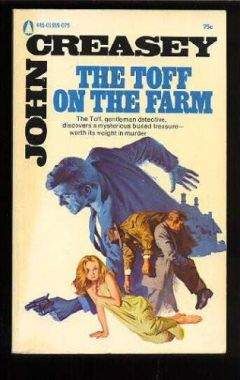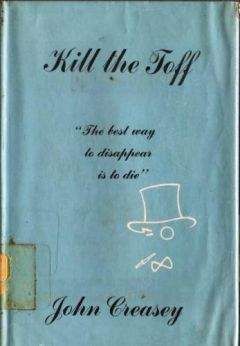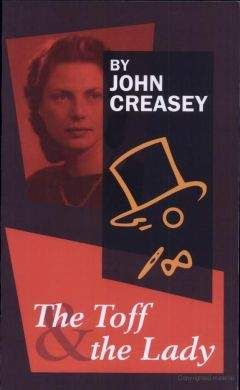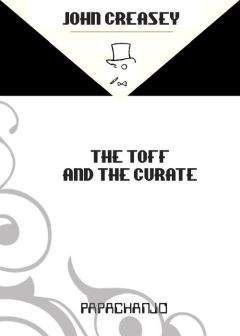John Creasey - The Toff and The Sleepy Cowboy
“This is Stevens of the Daily Globe,” a man replied. “Good evening, Mr. Rollison. Were you at the scene of a fire in Fell Street, Chelsea, this afternoon ?”
“Yes,” answered Rollison.
“Did you raise the alarm, Mr. Rollison?”
“No. I was too busy chasing the man who had started the fire.”
“Did you catch him, sir?”
“No. He escaped on a motor-cycle.”
“Do you know he was the man who started the fire?” asked the reporter, with mild insistence.
“I am satisfied he did but I couldn’t prove it.”
“I see, sir. Were you in or outside the house at the time?”
“Inside.”
“Thank you very much, Mr. Rollison. I have a state-ment from a Mr. Hindle, who lived in one of the flats downstairs, to the effect that you appear to have been upstairs just before the explosion which preceded the fire.”
“I was,” stated Rollison.
“And according to this gentleman, sir, the wife of the tenant of the flat upstairs believed you had been in her flat during her absence. Had you sir?”
“If she was absent, how could she know?”
“Isn’t that evading the question, sir?”
Rollison found himself teetering between annoyance and amusement; and for the moment amusement won. He chuckled.
“No comment,” he said.
“Mr. Rollison, in the public interest —”
“In the public interest and in the interest of the Globe newspaper, no comment,” insisted Rollison.
“Mr. Rollison — your duty is surely —”
“Do you know, Mr. Stevens, I have known many police officers less naive in their questions and far less likely to prejudge an issue than you.” Rollison said. “No more questions — at least, no more answers.” Now, he was neither amused nor annoyed, but very wary.
“Mr. Rollison,” the newspaperman went on. “I don’t know that you are in a position to flaunt the Press. The lady in question, the wife of an actor, gave birth to a male child, this afternoon, a premature birth believed to be as a result of the incident. It is of considerable importance in your own as well as the public interest, for the truth to be known. Before going to hospital she accused you of forcing entry into her flat, and leaving behind a high explosive bomb which wrecked not only the flat but led to the destruction of the upper part of the house. In the public interest —”
“Mr. Stevens,” Rollison interrupted.
“Yes, sir.”
“Do I understand you want a statement from me?”
“Yes, sir. In the public —”
“The woman is a liar,” Rollison said.
“Mr. Rollison! A woman in such a condition would hardly make such wild accusations without some reason to believe them. If you were in her flat, sir, she may well have reason to believe you did cause the destruction —”
“I did not,” Rollison said, “and her condition might well have made her hysterical.”
“Were you in her flat?” demanded the newspaperman, in his persistent way. “That is the crucial question. If you can deny that, the Globe will naturally publish the denial. If on the other hand you cannot or will not deny it, then the Globe will of course publish the lady’s statement —”
“And lay itself wide open for action for libel,” Rollison interrupted. “Let me ask you a question, Mr. Stevens. Have you interviewed the husband, Alec King?”
“No, sir.”
“Why not?”
“We have not been able to trace him, but the moment we do —”
“Now that really will be in the public interest,” said Rollison, firmly. “Find the missing husband, and you might find the answers to most of the questions you’ve asked and a lot you haven’t asked. Goodnight.”
On that crisply uttered word, he rang off.
12
Pamela Brown
ROLLISON TURNED FROM the telephone to find both of his visitors watching him, Jack Fisher frowning, Tommy Loman with characteristic calmness; he seemed always to be looking not only at but beyond the Toff, like a man used to peering into long distances.
“Was a newspaper trying to blackmail you?” demanded Fisher.
“More like whitemail,” answered Rollison lightly. “Even the police are not above trying it at times. Forget that, please. How about another drink?”
“No, really, I must go,” said Fisher, as if regretfully. “I have an appointment at half-past six.” He gave a smile which brightened his blue eyes. “A date, you know.”
“You want to be careful,” remarked Loman. “You don’t want to give anyone an excuse for whitemailing you. Does he, Richard?”
Fisher frowned, until suddenly he saw the point and gave a hearty laugh, while Rollison chuckled and Loman regarded him with almost benign approval. Fisher left, effusive in his thanks, and Rollison sent him on his way with a quiet:
“How could I do less for a man who was such a help?”
Fisher, apparently covered in embarrassment, hurried down the stairs. Rollison turned back into the big room, to find Tommy Loman regarding him with his eyes smiling but his face set and even stern. Rollison was strangely aware of the contrast; it was seldom that he had to look upwards at a man, or be looked down upon. They stood for a few moments and to Rollison this seemed the first quiet spell he had known all day.
At last, Loman sank into a large armchair, diagonally across a corner, and Rollison sat in a rather smaller chair, opposite.
“Is that right — he did you a service?” asked Loman thoughtfully.
“Yes.”
“He’s a funny little guy.”
“How funny?” asked Rollison.
“Cute.” Then Loman went on: “Kind of nervous. Didn’t you think he was nervous?”
“I make some people nervous,” Rollison remarked.
“Not that kind of nervous,” replied Loman. “He was surprised to see me here when he arrived, I seemed to make him kind of jumpy.” That slow, attractive smile dawned and stayed.
“Have you ever looked up at a giraffe without expecting to?” asked Rollison lightly. “Tommy, I’ve a guest coming for dinner and I’d like to talk to her alone for half an hour or so before we eat. Would you mind —?”
“I can take a bath,” Loman interrupted, instantly placing his hands on the arms of his chair. “You don’t have to eat with me, Richard. I can go into the kitchen with Mr. Jolly, he —”
“I only need half-an-hour tete-a-tete,” Rollison said firmly. “I —” There was a ring at the front door, and he broke off to say: “This may be her.”
Loman was on his feet in a trice, uncoiling like a giant spring. He went to the spare room along one passage while Jolly went to the front door along the other. Rollison could see the lounge-hall from here but before he saw the visitor he knew it was Pamela Brown, because she said in an eager voice:
“Mr. Rollison is expecting me.”
“Miss Brown?” asked Jolly, standing aside. “That’s right — Pamela Brown.”
“Mr. Rollison is certainly expecting you,” Jolly said, and turned as Pamela entered.
My! thought Rollison.
She looked ravishing in a dark green dress with a deep V neckline, her hair piled high, her eyes bright, ear-rings dangling and a brooch glittering at her bosom. The dress rustled faintly as she walked. It fell just above her knees, and for the first time Rollison saw that she had beautiful legs; he already knew that she moved with youthful grace. He was out of his chair and on his feet when she came in with one arm held out; he extended both hands and took hers.
“Ravishing!” he uttered the word that had first come to mind.
“Oh, thank you!” She had nice, cool hands, and she looked into his eyes, not about the room. “It’s lovely to be here.”
He held on to her hands a moment longer than was necessary, then drew her into the room. She looked about her, at and beyond the Trophy Wall, at the paintings on one other wall, at a group of four etchings of old London, and at the pieces of antique furniture ranging from Elizabethan through Georgian and Regency to Victorian all of which fitted perfectly in their places and merged together.
“What will you have to drink?” he asked.
“May I have something soft — ginger ale or bitter lemon?”
“Of course,” he said.
“You see,” she exclaimed with the familiar naivete. “I don’t drink alcohol.”
“Not at all?” He was surprised.
“Never.” She gave the word a slight emphasis and her eyes danced. “What a lovely flat you have. And — may I have a closer look at those macabre things on the wall?” She took her drink and they moved towards the wall as she went on almost in the same breath. “Did I see Baby Blue Eyes in the street as I was parking my car?”
“He’d just been in for a drink,” said Rollison. “How well do you know him?”
She looked at him quite sharply. “I’d never met him until this morning,” she said. “What makes you think I know him?”
“He didn’t mention you to the police,” said Rollison drily. “I couldn’t believe that was an accident.”
“Oh, poof! He was dazzled by the Toff and just didn’t see me!”
“Any man who doesn’t notice you is no man,” replied Rollison.
“But how gallant!” Her eyes danced again. “Well, let’s say he was so overcome when he realised who you were and what had happened, that he forgot me.”
“Which would make him even less of a man.”
“You are determined to live up to your reputation!” She looked away from him at the silk stocking which was draped over a polished brass bracket, and asked with new-found solemnity: “Is that a murder weapon?”
“Yes. Did you know about this wall and my reputa-tion or had you been looking me up?” he asked.
“Who could tell me?” she asked.
“Any newspaperman who wanted to.”
“Oh,” she said. “Yes, I suppose so. Well, as a matter of fact, I knew.”
“Just as you knew I was going to meet Tommy Loman at the airport.”
“Yes,” she said. How beautifully her eyes glowed. “Mr. Rollison —”
“Richard.”
“Richard, I cannot tell a lie!” She was acting very slightly, as if this in many ways amused her; she was laughing partly at herself, partly at the situation, partly at him. She lowered her voice and went on melodramatic-ally: “I am a private inquiry agent.”
“Good God!” he gasped.
“You mean I fooled you?” She was delighted.
“You fooled me utterly. At the very least I thought you were a seductress, plotting to seduce Tommy Loman.”
“Oh, nothing so unexciting,” she replied. “He isn’t the man I would try to seduce! I wrote to Tommy Loman and invited him in your name to come to London and see you,” she went on simply. “I signed the letter P. Brown, for Richard Rollison.”
This time Rollison was really astounded, but all he said was: “In my name?”
“Yes. I thought he would come if you invited him, whereas if a strange woman wrote, he might shrug it off. Aren’t you going to ask why?”
“Yes,” Rollison said heavily. “Why?”
“Because I believed he would run into trouble if he just arrived here and had nowhere to go for help.”
“I see,” said Rollison.
He was studying this young woman much more closely, reasonably sure that she was telling the truth but fully aware of how easy it would be to be fooled — ‘seduced’ — into accepting her on her face value. The harder he looked, the more flawless her complexion and the more beautiful her eyes; and the dress was most enticing, showing just enough of her white bosom and shoulders. She seemed to sense that it was a moment for silence and she made no attempt to speak or prompt him.
“Why should he run into trouble?” he asked. “Because he was coming to claim a fortune which someone else wants to take from him.”
“What fortune?”
“A great-uncle, his grandfather’s brother, left a for-tune and Thomas G. Loman is the only legatee,” she said. “And someone thought it a good idea to stand-in for the real Loman and collect the inheritance.”
“How did you know that?” Rollison asked quietly.
For the first time, she hesitated, and he preferred that she should; the series of swift answers made her sound almost glib. She sipped her ginger ale, swallowing slowly as if her mouth was dry, and finally went on:
“It’s a very long story, Mr. Rollison. If I’d been able to produce facts and evidence I think I would have gone to the police and told them — after all, it’s really their job, isn’t it? But I had only an old man’s fears and suspicions to go on, and — and a feeling, an intuition. Please don’t laugh.”
“I wouldn’t laugh even at a man’s intuition,” Rollison assured her.
“You see, old Josh — that’s the great-uncle — had a kind of persecution mania. He was ninety-one, and remarkably fit physically and no slouch mentally, except in this one way — he thought someone was always trying to rob him, and had a fear that someone outside the family would get his money when he died.”
“When did he die?”
“Just a month ago.”
“A natural death?”
“Yes — indisputably, I think.”
“Was there an autopsy?”
“Yes — I work with my father and a brother, Mr. Rol —”
“Richard.”
“Thank you, Richard! And my father has been in the profession for a long time. The police respect him and he telephoned the Superintendent of the Hampstead Division where Mr. Clayhanger lived, and said an autopsy might be advisable although a death certificate was signed. One was carried out by Kenneth Soames, and you must know pathologists don’t come any better.”
“I do,” admitted Rollison, becoming more and more intrigued. “What was the cause of death?”
“Cerebral haemorrhage. The old man had had two mild strokes so that wasn’t surprising,”
“And can’t easily be induced,” Rollison remarked. “Did he have a nurse?”
“Yes — a day and a night nurse in his last months. He —” She leaned forward and touched Rollison’s hand with her cool fingers before going on : “My father went to see him first, and took his fears seriously because he had such a lucid mind. He knew there was a nephew in Arizona, who was the only surviving relative, and wanted him traced and wanted to make sure he got the inheritance. Then one day my father was ill and my brother away and I had to go and see old Josh.” She gave a funny little strangled laugh. “You’ll never believe it, but he took a great liking to me.”
“I will try to make myself believe it,” Rollison said drily.
“And I’ve never met a man I liked more, whatever his age,” Pamela Brown went on. “So after that I would take the weekly report now and again; saying that we hadn’t yet traced Thomas George Loman, and found nothing to suggest anyone else had any claim to the inheritance. All he ever said was : ‘You will keep trying, won’t you’.”




